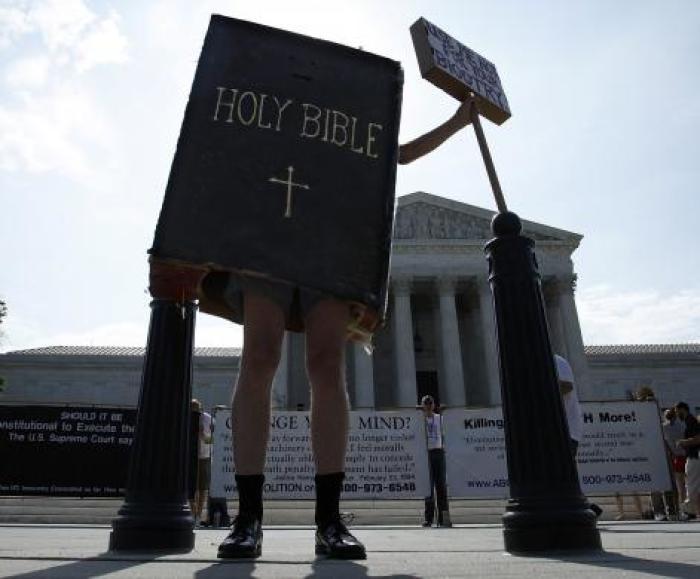Who Really Won the Hobby Lobby Battle?

WASHINGTON — While Hobby Lobby won its lawsuit against the Obama administration's birth control mandate, it was a battle already won by liberals and the only issue in the court case was how thorough the Right's political defeat would be, Philip Muñoz, Tocqueville Associate Professor of Religion & Public Life at University of Notre Dame, argued Sunday during a roundtable at the American Political Science Association's Annual Meeting.
The U.S. Supreme Court's decision in Burwell vs. Hobby Lobby represented "an overwhelming victory for the political Left," Muñoz said.
Other participants of the roundtable, "Sebelius v. Hobby Lobby: The Morning After Pill, Corporate Convictions, and the Future of Religious Liberty," which was sponsored by Christians in Political Science, included Alliance Defense Fund's Gregory S. Baylor, Americans United for Separation of Church and State's Greg Lipper, and American Jewish Committee's Richard T. Foltin.
Muñoz presented three propositions, noting that since he was not 100 percent confident, he did not want to call them three conclusions.
1) "The Hobby Lobby decision was a victory for Hobby Lobby, but was not a victory for the cultural Right or believers of traditional sexual morality."
While the legal question was about who should pay for birth control coverage, Muñoz said, undergirding the debate was a fight over "sexual morality as expressed in governmental policy and law," or "what will the law teach about sex?"
"Any laws concerning sexuality necessarily substantiates teaching about the morality of human sexuality," he said. "That's inescapable and there's no getting around it. Laws that regulate sexuality in some way teach something. So what is it they teach?"
Generally speaking, Muñoz explained, there are two broad understandings about sexuality: The "traditional view" that says "men and women are called to live to a normative standard of human sexuality that they themselves do not create;" and a "modern view" that says "men and women are and ought to be their own authors of what constitutes the proper use of sexuality."
Muñoz believes these different views of human sexuality are at the core of almost all "culture war" battles. From that perspective, the Left already won the fight when the Affordable Care Act, or "Obamacare," was passed and the Obama administration was provided the authority to implement the birth control mandate, he argued. The Hobby Lobby case did not address the issue of whether there should be a birth control mandate but to what extent those who hold the traditional view would be accommodated.
"The Hobby Lobby case wasn't really a contest between the traditional and modern views of human sexuality. The only dispute was how thoroughly the modern view was going to route the traditional view," he said.
In other words, the issue in the case was whether "the modern view was going to coerce the traditional view directly [and] impose its view on traditional religious believers ... or only indirectly through generally applicable taxes?"
2) The norm of the birth control mandate was left untouched by Hobby Lobby and that norm is hostile to traditional religious beliefs.
The birth control mandate teaches a norm that is consistent with the modern view and is hostile to the traditional view because it is consistent with the view that sex should be disconnected from children, Muñoz said.
"The nature of law is to specify what is right and wrong, and thereby to teach what is good and bad," he explained, and in the case of the birth control mandate, "the Obama administration aggressively teaches that sex and babies should have nothing to do with one another unless you choose for them to have something to do with one another."
In other words, the birth control mandate teaches that the traditional view of sexuality is wrong and the Hobby Lobby case did nothing to challenge that presumption.
3) "The left side of the political Left position toward religious belief and religious freedom has thoroughly shifted from toleration and accommodation to marginalization and exclusion."
Traditionally, Americans believe in "live and let live," Muñoz explained, and liberals used to respect the rights those who held religious beliefs that are different from their own, but "that view, I'm afraid, is no longer true ... at least on the left of the Left."
Now, Muñoz believes, liberals, or at least the less moderate liberals, treat those who hold traditional religious views like they would treat racists by attempting to remove them from participation in civil society. The most liberal liberals have held this view for a long time, Muñoz added, but what has changed is that they are now more aggressive in their efforts to drive the traditionalists from the public square.
"That space of civil society, that's what the left of the Left is after. They want to cleanse religious believers from that space," he said.
Providing examples, Muñoz mentioned pharmacists who oppose the use of abortifacients forced out of their jobs and religious adoption agencies being forced to treat same-sex households the same as married heterosexual couples. The next effort, Muñoz predicted, which "will happen very, very soon," will be to remove college accreditation from colleges that hold to the traditional view.
People disagree on these issues, Muñoz said, because they have different conceptions of what liberty means.
During the Q&A period, Lipper compared today's religious freedom arguments in areas related to sexual morality to arguments previously made in defense of racial segregation.
"These arguments were being made with regard to racial segregation," he said, "the Religious Right movement ... actually formed out of entities seeking a free exercise right to discriminate on the basis of race."
In response to that accusation, Baylor noted that one his clients in a birth control mandate case, Geneva College, also fought the federal government on religious freedom grounds in the 1800s when it was being forced to comply with the Fugitive Slave Act, which was in opposition to its beliefs in racial equality and its opposition to slavery.





























